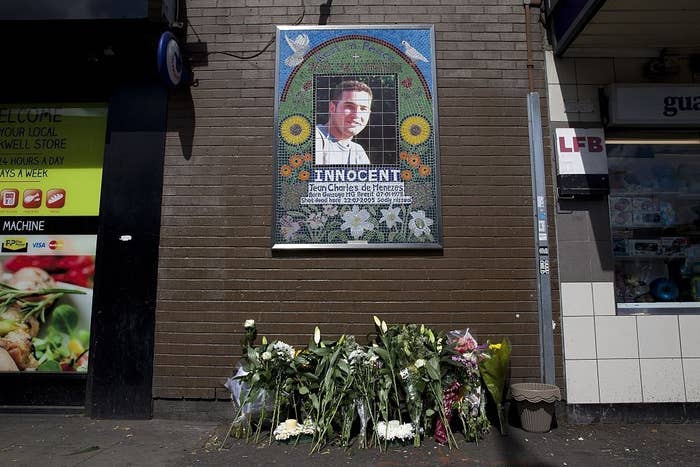
The police officers who shot dead an innocent Brazilian man at a tube station after mistaking him for a suicide bomber should not have been charged with criminal offences, according to the European Court of Human Rights (ECHR).
The court ruled on Wednesday that British prosecutors were right not to charge the two Metropolitan Police Service specialist firearms officers who killed 27-year-old Jean Charles de Menezes at Stockwell station, south London, on 22 July 2005. The decision was made by 17 judges, including one Briton, and was carried with a 13 to 4 majority.
The Met was found guilty of breaking health and safety laws over the shooting and ordered to pay a fine of £175,000 and legal costs of £385,000, but no individual officer has yet been charged with any specific crime in connection to de Menezes' death.
The ECHR rules that it was right that CPS didn't charge the officers who shot dead John Charles De Menezes
The ECHR said in its ruling that while the frustration of de Menezes' family was "understandable", the decision by the Crown Prosecution Service (CPS) not to bring charges was because "there was insufficient evidence against any individual officer to prosecute".
The ruling comes after a seven-year legal battle fought by the victim's cousin Patricia Armani da Silva to overturn the CPS's 2008 decision not to bring criminal charges against any officers in connection with the case.
Da Silva had argued the UK government had not properly investigated the death nor held the police to account, under article 2 of the European Convention on Human Rights, the right to life.
She said in a statement on Wednesday afternoon that the family was "deeply disappointed" at the ruling.
"We had hoped that the ruling would give a glimmer of hope, not only to us, but to all other families who have been denied the right to justice after deaths at the hands of the police," she said.
"We find it unbelievable that our innocent cousin could be shot seven times in head by the Metropolitan police when he had done nothing wrong and yet the police have not had to account for their actions."
Her legal team had questioned whether the threshold for prosecuting the police – which meant the CPS decided against bringing charges – is too high. The court rejected this and said article 2 didn't require a change in the evidential threshold.
Da Silva has also criticised the UK's definition of self-defence – that the officers only had to show they had an "honest belief" the use of lethal force was necessary. The ECHR noted that UK authorities "carefully examined the reasonableness of their belief".

De Menezes was shot as London was reeling from the 7 July attacks two weeks earlier, in which 52 people died, and while a huge police counterterror operation was underway.
On 21 July, the day before he was shot, police uncovered a failed terrorist plot to bomb three London Underground trains and a bus. The explosives failed to detonate and a police operation was launched to find the would-be bombers, amid fears they might try again.
De Menezes was placed under surveillance because he lived at the same address as two of the suspected terrorists in Scotia Road, south London. On the morning of 22 July, de Menezes was followed by surveillance officers as he set off for work.
The specialist firearms officers who had been tasked with stopping any potential suspect leaving the Scotia Road address weren't deployed in time – instead, they caught up with surveillance officers as de Menezes entered Stockwell station, before following him on to a train, pinning him down, and shooting him in the head several times.
An investigation by the Independent Police Complaints Commission (IPCC) in January 2006 found de Menezes had been killed due to mistakes that could have been avoided, while suggesting the officers involved may have committed criminal offences such as murder and gross negligence.
However in 2006 the CPS decided against bringing any charges against any individual officer because there was "insufficient evidence to provide a realistic prospect of conviction".
It said in a statement that year: "The two officers who fired the fatal shots did so because they thought that Mr de Menezes had been identified to them as a suicide bomber and that if they did not shoot him, he would blow up the train, killing many people."
The CPS confirmed this position in 2009 after an inquest into de Menezes' death recorded an open verdict.
In May 2007 the IPPC also ruled that no disciplinary action should be taken against the officers involved because of the unrealistic prospect of proving any wrongdoing.
